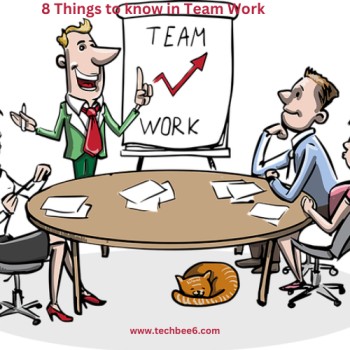I’ll bet you would recognize the word “cooperation,” wouldn’t you?
Teamwork is working together for the good of the group. That seems like an easy concept. Sometimes, though, we get pretty wrapped up in “me-ism.”
1. Team members share an understanding of what they trying to do and where the team is going both generally and in terms of specific objectives:
The team’s analysis (and individual members in it) of the project is sound. Project elements and technical, resource-based and human difficulties are understood. Team members understand their role and scope for contribution (duties and responsibilities). They feel able to participate.
Google says, Objectives may not be written down or even formally discussed – many will be implicit. Understanding is shared – the left – hand knows what the right hand is doing. However in complex, multi-disciplinary projects these matters need systematic attention from an early stage to avoid frustrations/confusions that may jeopardise team effectiveness. As the team project advances objectives, purposes and goals will need to be reviewed.
2. Openness and confrontation:
Where the team is working well people can express themselves openly and confront mistakes, confusions or frustrations. Such feedback can be received without recrimination and act as feedback to team members and management.
Read more: Five types of Strategies for Managing Conflicts
Support and trust:
Personal relationships need to be sound (not always easy – people being what they are). Trustful working relationships stem from
- Positive orientations to others.
- Being helpful, endeavouring to understand the perception and difficulties of others.
- Support/trust can be observed from our behaviour and how were reveal our attidudes to others.
- There is no easy, idealised package of skills but team members can examine their assumptions about others and work hard to offer “unconditional positive regard for others” (i.e. not letting your own feelings limit how you relate to others when working with them).
Such concerns are important for team leaders responsible for giving feedback to members whose actions are generate difficulty within the team.
Ideally, the team can be an open, supportive, unthreatening environment but in reality there is often too much at stake between people at work (personal rivalry, politics) to make deep personal exchanges with others and easy process.
4. Co-operation and conflict:
Healthy competition can stimulate ideas and energy but unhealthy competition and conflicts, hidden agendas and stereotyping of people and problems need to be avoided. If differences of view can be used contructively, members can take pride in the creativity of their shared working effects and successes.
Read more: Tips to be a Successful Leader
5. Sound procedures:
Effective teams need sound procedures from the calling of meetings and agreement of agendas to getting the basics of running a meeting right. Team notes, records etc are needed provided that the team leader is not drowned in a sea of bureaucracy.
Sound procedures include e.g.
- Drawing up roles and targets for members.
- Chairmanship skills; briefing, summarizing, questioning and exploration skills.
- Setting the right priority to agenda items, ensuring that people who are only needed at the meeting for ten minutes are not forced to sit out a 3 hour marathon are other such basics.
- Fair terms and conditions of employment, equity in rewards between team members.
- Use of a flip chart to note the structure and progress of issues at a meeting can be useful. Somebody has to have the confidence to get up and do this.
- Decision-making too needs to be clear-cut. Is a team decision required? Can team members vary the plan independently of the team? Do we need to vote? Does the team leader have final say? How does consensus decision-making really work?
These and other such matters come under Woodcock’s ‘sound procedures’ heading. They suggest access to a ‘tool-kit’ of approaches, which help to structure team activities and keep the team on target.
6. Appropriate Leadership:
The energy, orientation and competences of the appointed team leader is an issue – particularly where the project leader is not necessarily the most expert or senior person in the team.
- Planning.
- Initiating.
- Organisation.
- Controlling skills.
…are required plus ability to work at relationships so that individual members can play a full part and the team as a whole is brought together. Team identity needs to be created – difficult if individual team members are also members of several other teams at the same time.
Leadership is about
“carrying the can”,
winning commitment from others
ensuring that the team is not working in a vacuum
proper communication flows within the team and up-wards, downwards and sideways through the organisational system.
The team leader has to be a
- tough-battler,
- friendly helper
- and a logician
…rolled into one. There are times when each has a part to play. The problem occurs when the team leader is effective in one role but the other two are not his/her forte. Here other team members can give support using their skills and abilities for the team as a whole.
7. Regular Review:
A team regularly reviews
- Where it is going
- Why it needs to go there
- how it is getting there.
Such reviews often do not take place – we become caught in an activity trap or we horde our views, expectations, needs and aspirations about the team’s progress – we merely moan about these things.
A review can be at a task level i.e.
- are we achieving our objectives
- are we combining our efforts appropriately
- are we getting results in the right way?
A review can also focus on relationships:
It is seldom that can be accepted by others. The best way to get feedback is to ask for it i.e. indicates opennes, willingness to listen and (hopefully) act differently if the feedback suggests this is appropriate.
We usually do not relish this type of learing experience at work because of reasons of embarrassment, having to justify your remarks and because the aftermath of revealing private thoughts about how others contribute or do not contribute may be difficult to handle.
Individual development:

Personal and individual development is usually highly rated in team-working. Member’s needs for growth, all-round ability, satisfaction of needs, opportunity, experience need attention.
Conclusion:
So these are the few things to know about Team work to get most out of it. Also it’s help us to apply in our working environment as well.



